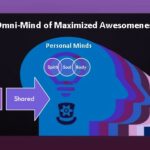Does a fetus have a soul? What about a spirit? Is it a person? Does it have an identity? When? Is there something wrong with abortion? This isn’t going to be an easy episode. But I can’t talk about the soul or identity theory, as we’ve been planning, without touching on this emotionally divisive topic, which is suddenly back in the news. So here we go. Ready?
Where do I begin?
Or when?
And how do I approach this delicate topic?
I’ll start with a warning. Over the next few episodes, we really are going to talk about abortion. I also need to warn you that I had a hard decision to make in preparing this particular episode. I was afraid I couldn’t adequately describe both the soul and the spirit in terms of personal identity, or its value, in the time allowed. I was right about that. I can’t. But I also knew you’d want me to get to the point. I’m guessing you’d like to know what pamalogists think about abortion, now that I’ve mentioned it. So, I’ve decided to combine what really needs to be two episodes into one. To do that, this will take a little longer than most of our other episodes.
I should also add a plug for the CounterChecker. Please help. I need to raise $1.4 million to adequately get it started and it should take about nine months to develop. Then once its up and running, it will be the ideal place to follow up on any discussion you find here. You can challenge any point publicly and watch a fair discussion ensue. The first thing I’d like to talk about there is the claims I make in Pamalogy 101. As I hope you already know, the CounterChecker is a truth machine that fact-checks fact-checks and creates a fair system for scoring truth claims.
Remember, we’re giving away top hats to those who pass our free Pamalogy 101 course. Pamalogy 101 doesn’t talk about abortion. It talks about the maximization of awesomeness. I’ve made the claim that I’ve proven maximized awesomeness is real. Bringing abortion into this discussion wasn’t the original intention. That was sort of imposed on us when Roe v. Wade was back in the news, granting states the right to decide on policies and law regarding women’s rights and fetal rights.
Any discussion of abortion puts me in a predicament. Being male, many will say I have no right to speak on the subject and I don’t want to alienate my audience. But how can I talk about what a soul is if I don’t? To resolve this problem, I’m going to ask that you separate legal issues from identity theory, at least for today. That way, we can continue the discussion of identity theory that we started before the possibility that Roe v. Wade might be overturned was in the news. Unless you’ve jumped into this blogcast late, you already know that when I started releasing it in November 2021, we were having a reasoned discussion that was intended to lead up to the question of what we were, and we’ve already covered many things, setting up the backdrop for this conversation.
You may recall, for instance, that we already touched on the subject of conception when in Episode 3, we considered the cloning of Captain Kirk. Remember? We weren’t talking about fetal rights, or women’s rights. We were talking about identity. If it is true that life begins at conception, the question is whose life? If twinning can occur up to 14 days after conception, then multiple identities can be associated with the same cells and the same DNA. Knowing this, which part of the cell mass should we associate with James Thomas Kirk #1, and which with James Thomas Kirk #2?

If you will recall, I compared the twinning of embryos to the twinning of Universes. If it is true that every good possibility takes place in the context of a Multiverse, then the past history of any Universe is actually a bundle of future Universes sharing a past. A Universe is not one. It is many. It is so many that it is difficult, if not impossible, to count. If Maximized Awesomeness is real, then every shade of possibility that will contain any novel variety of goodness branches into a separate future history. This is how every good possible thing can occur. This is the core tenet of Pamalogy. It’s what we are always here to talk about and it begs the question of what we are in that context. It demands a compatible theory of identity.
Among philosophers, the subject of identity theory centers around the mind body problem. I’ve touched on this repeatedly but spared you the detail. In our last episode, I was careful to point out that personhood was not equivalent to the body or the brain. Identity theorists look for a relationship of the body, brain and mind. Aristotle might be worth reading for a start on that theory. Association of person with a body or an organism is problematic. It fails to consider how a person changes cells throughout a life time. In favor of the organism theory of personal identity is that there may be some continuity even if every cell in the body is replaced. But what about brains and what about the mind? And what if a person has a brain transplant? Is the person their brain but not their hand? Think again. What if only the left side of the brain is transplanted and not the right? I think that to answer this question fairly, we need to realize that if we say, “we evolve,” then we aren’t saying who or what we are. We certainly are not our body. The “we” ness of what we are is definitely retained, while the body changes or dies. The body is more like a vehicle for what we are in it. And if we wind up with halves of separate brains, “we” have a combined consciousness of some sort as a result. “We” change our mind.
What is the “we”ness. What is the “I” in identity if not the body organism? And what is it if we are in a Multiverse?
The problem with identifying a person with a mind is that the mind also changes. Sometimes it has no consciousness at all. What if the mind doesn’t remember itself? Do you remember being a fetus? Do you remember being 1 year old? Do you remember what you had for lunch yesterday? The problem with the mental state theory of personal identity is that while there may be one organism producing consciousness at any given time, saying that you as a conscious forty year old is the same as you as a formerly conscious four year old, or four month old fetus, leaves more continuity with the organism than with the mind.
So, the bodily organism can’t be the person because the cells all die and are replaced with new cells. The mind also can’t be a single person because the states of the mind also continually die and are replaced. In both cases, the continuity exists in something that keeps dying and returning in some new form, whether of a set of cells or in a new and different set of memories and awareness.
Consciousness also is not a constant. Unconsciousness happens both prior to the development of a nervous system, as in the case of an undeveloped fetus, and during anesthesia, and during deep sleep, comas and other types of conditions. Does unconsciousness mean there is no person? Is a person in deep sleep or a coma no longer a person? Why call them a person? And let’s not forget that the odds of your consciousness occurring at a given point in time are best explained if your consciousness is constant, rather than temporary.
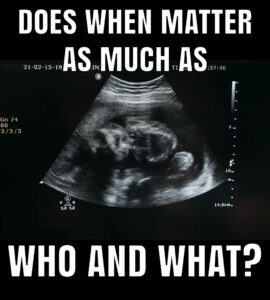
In the last episode, I identified the mind as belonging to a person. I did not say the mind was the person. I also showed why the mind is more than the organism. It is not the brain. Do you remember? It is because of that best explanation and because there is nothing physical about abstract thoughts like five and five equals ten. The mind may be enabled in consciousness by a body to be aware of a place in time, but it is best described as the world of awareness that a person has in a restored dualistic framework unique to pamalogists. A person has a mind. A mind is not the person. A person’s mind can change.
So, if not a mind, not a brain and not a body, then what is a person? Pamalogy always goes back to Maximized Awesomeness. Like a mind, a person adds nothing to Maximized Awesomeness that Maximized Awesomeness does not already have. A person can be no more than a relational sharing in the fulness of good possibility. A person is a relational part. Wholly other than Maximized Awesomeness Itself, yet also part of Maximized Awesomeness Itself.
Similarly, the minds, which persons have, are wholly other yet also part of Maximized Awesomeness Itself. The OmniMind includes all thoughts of all minds. It knows both all knowing and all unknowing. It knows discovery and It knows relations. It knows discovery by knowing what it is to be any and every person with any and every thought, every mind. Yet, as a whole, it is not that lesser thing. The lesser thing, the person, and the lesser mind, simply shares in the abundance of the greater. If this wasn’t true, then Maximized Awesomeness would lack some good thing.
By definition that would be untrue. And if Maximized Awesomeness is true, then what I’m describing is also true. If you want to see with certainty that Maximized Awesomeness is true, take our free Pamalogy 101 course, and earn yourself a top hat. Maximized Awesomeness is true.
So what is a soul? And what is the difference between a soul and a spirit and a person? If pamalogists are dualists, believing in souls, is there any distinction between these things?
To answer this question, I think we should reconsider the two types of experience we’ve already covered. Do you remember the multi-level nested digital library I described in Episode 12? There were two types of conscious beings – accessors and accessees. The accessors were atemporal in relation to the lives they accessed. They had access to the whole digital library. They weren’t subject to its laws of time.
We have the habit of thinking in time because that is what we experience. We tend not to think about the fact that it would be awesome if we were inter-dimensional beings who could access more than one Universe and more than one version of ourself. As a result, when we think of a soul, we tend to think chronologically in reference to one Universe and one soul. We think about what happens to our soul after we die. And some of us, not all of us, think about what happens to the soul of a fetus after it is aborted.
That habit fails to consider the Multiverse. In the Multiverse, we need to view persons as possessing souls – groups of souls – bundles of souls, not single individual souls. A person is an accessing identity. A person is who we are, not just what we are. A soul is a description of what we are as an accessee, not who we are as an accessor. We only point to souls as who we are because we are talking about the soul of a person.
It is a person, who accesses a temporal life, or a bundle of them. A person accesses a human body with a brain, and does so from an extra-temporal framework. An organism, body and brain, may be associated with a bundle of souls. Persons access their souls. In some cases the person accesses interactively. In other cases, the person just enjoys the ride of a soul in a deterministic Universe. The soul itself is the soul of a person, who accesses lives from one particular library of lives. The person is not chronological. They are atemporal, able to access any point in time in any life in the library of lives associated with it in their soul-filled library.
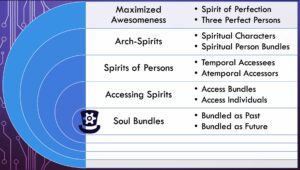
Spirit is a broader term. The library has many levels, nesting libraries within libraries. A spirit is something with a character that can be shared by multiple persons in multiple libraries. Some types of spirits have characters that change and others don’t. Some spirits are persons and others are not.
As an example, Maximized Awesomeness Itself is a Spirit – the Spirit of Perfection, but it is not just one person. The character of Maximized Awesomeness does not change since it is Perfect. Yet, it is best described as having three relations of Personhood sharing one Perfection, one Perfect Spirit. It is Perfecter. It is Perfecting. It is Perfect. These are three relational identities. Personhood is an identity. Persons share spirits. And souls are sub-identities of persons.
Similarly persons can also be spirits. In fact, each person is a spirit – the spirit of that person, with all of its character. More than identity they have a character in relationship. In some cases and in some ways that character can change. In other cases and ways that character will not change. Change, of course, requires temporality. It requires some association with a Universe or set of Universes that have dimensions of time to change in. Whether a person changes in some aspect is a matter of reference. We may possess both temporal and atemporal aspects of what we are. From the perspective of a temporal Universe, even Maximized Awesomeness changes. It has a relationship with it in time, even though Maximized Awesomeness Itself is atemporal.
Words like “soul” and “spirit” come loaded with traditional ideas, many of which can be confusing. Pamalogists will use the terms in very specific ways that clarify what we are in terms of identity theory. The nested library containing nesting libraries within itself, involves being accessed at various levels.
Among those who believe in spirits and souls, a person is usually thought to have a soul, and sometimes also a spirit. The terms “soul” and “spirit” are often used interchangeably. Please dispense with that. We need to look at experience from two directions – temporality, in other words Universes with a dimension of time, and atemporality, Universes without a dimension of time. A spirit is a character that can be shared by multiple persons and multiple souls, whereas the spirit of a person is that person. They are capable of sharing many of the spiritual aspects of what they are as sharers in some portion of Maximized Awesomeness, but they are not capable of sharing their personhood itself because their personhood is their very own unique identity and relationship with Maximized Awesomeness.
The person is thus a spirit, but is the person a soul? Or do they just have a soul?
Remember that souls can be bundled so that sharing is entirely uniform, but as Universes are split, variety results rather than uniformity. From the perspective of temporal Universes, we should see souls as unraveling bundles. In the past, there is a bundle of souls all sharing one history. In the future, that bundle of souls unravels as it splits. Are persons being bundled and unbundled as this happens or just souls?
I say just souls. To understand why, we need to try something we normally don’t. We need to imagine viewing things from an atemporal perspective.
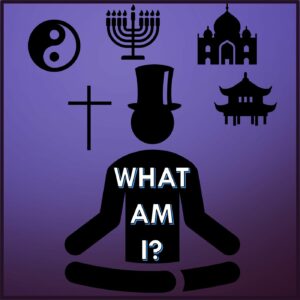
What we see from the atemporal viewpoint, is a giant library of moments in an enormous number of Universes. From here we could ask, who sees from an atemporal vantage? What identifying entity accesses the lives of so many versions of self, so many possibilities of souls? A person does, a spiritual person. Persons are spirits. They don’t just have spirits. They are spirits.
All persons are spirits but not all spirits are persons. The spirit of Perfection, for instance, is not a person. It is the character of three relational persons.
Now the soul, all bundled up as many souls in a variety of temporal Universes, belongs to a person, not necessarily many persons. A person has a soul, and temporal souls come in bundles, so a person has many souls. Bundles of souls would be fragmented into many persons if they didn’t have any spiritual connection with an accessing person, but they do. And that is why we can look at someone and say they are a person with a soul. Their soul is that connection point to their real spiritual identity as a person.
We aren’t in the habit of thinking of that spiritual soul as an unraveling bundle, or of that person as being related to so many other versions of unraveling bundles of souls. Nevertheless, on account of the Multiverse, that is what souls are.
Now, I know this sounds complicated, but rest assured, I’m simplifying, as any philosopher familiar with identity theory will agree. Also this may seem irrelevant and unrelated to the topic of abortion. But it can’t be avoided. We need more precise terms than what we’re used to using. We need to base our terminology on a framework of foundational logic, rather than religious tradition. Like it or not, the picture gets increasingly complicated and weird as you think about it. Since the future goes on to act like the past, to be entirely accurate, what is being unbundled over time is groups of souls corresponding to groups of Universes, that are being unbundled, unravelled, together as groups, as bundles of Universes over time.
From there we need to level up. If libraries are nested inside one another, then persons must also be accessing persons accessing souls in bundles. If the person is a spirit with an identity that is being accessed by a still higher identity, then a person, though they may be atemporal in relationship to the souls they access, may still be temporal in relationship to the spirits it is accessed by. This means that a person, though a spirit, is also a sub-identity of a higher spiritual identity, or arch-spirit. Traditions speak of archangels and angels as spirits. We are in the habit of viewing these as commanders of armies of angels. If we don’t see it as mythical fancy, we think of authority rather than identity when it comes to archangelic spirits. We are in the habit of viewing even archangels as temporal beings.
But if we don’t view time as something moving forward uniformly, but as something where all points of time in all Universes are continually accessed, then the unravelling, unbundling concept doesn’t apply either to souls on any bottom rung, or to persons on any level of any accessing library. What applies is simply the full potential of all of the entities involved. The spirit, or spiritual person, being a character of something, engages in activity that is immaterial and abstract, while the soul engages in material activity.
Now if this Universe was all you were and you were just one soul, then none of this would matter. But you are a person who accesses libraries full of souls. Each soul is a different versions of you corresponding to a different Universe and it is all tied together by what you are as a spiritual person. That’s what you are. You are not your brain or body or mind in one Universe. You are a person accessing a temporal sphere, sharing portions of the Omni-Mind of Maximized Awesomeness.
In a hierarchy of things, spirits are on the top tier, persons are identities that can share in spirits, and souls are bundles of sub-identities belonging to persons. Spiritual entities are capable of taking on material life as persons with souls.
The soul is the part of the person that is referenced from the standpoint of a particular time in space in a Universe that includes the dimension of time. The soul, from that perspective is the person. We don’t see any difference. If we haven’t been taught otherwise, we might imagine a person with a spiritual soul – an eternal person with an eternal soul.
If you were a Christian, you might describe the soul as something that can be spiritual, drawn to glorious things, or carnal, drawn to evil things and bodily appetites. You might speak of a spiritual soul and a carnal soul.
You might also speak of the nourishment of the soul. The soul that feeds on spiritual things like prayer and good advice will grow spiritually, and the soul that practices evil things, like stealing and hurting others for personal gain, will experience a loss of its spiritual nature. You may have heard these descriptions before. I’m not going to reject these descriptions but, like the apostle Paul, in making this distinction, I’m going to point out our real identity, showing you why no evil really exists.
You probably remember this. Paul says that if he does the things of the flesh, not loving them, but does the things that he hates, he says “it is no longer I who do them, but sin in me.” Sin, and the doing of sin, is separated from the person. The person’s identity is spiritual, while their carnal nature has nothing to do with who they really are. They die to that person to live in Christ as a spiritual creation, born from above.
The pamalogist will see Maximized Awesomeness as informing us of what the soul is. The carnal soul has no place in that picture; only the spiritual soul does, since in Maximized Awesomeness anything that would be bad, is illusory, existing only as a construct serving good relationships with respect to it. And like Paul, we can see sin and acknowledge that it isn’t part of what we are or want to be. We can look to the heavens as the place of our true identity and anticipate a new heavens and a new earth to which we actually belong as the form of this world melts away. According to the psalmist, sin is removed from us as far as the East is from the West – in other words, an infinite distance. The pamalogist will say it never really existed. Still, none of us experiences life entirely without seeing sin or evil anywhere, so how does that work?
The pamalogist will say that there is no carnal soul other than an imaginary one. It is not who you are. Such a thing would have no part in Maximized Awesomeness. If you imagine yourself to be a carnal being, one inclined only to sin, don’t fret. That’s neither who nor what you are. It’s only a thought about you and your circumstances that you’re having, and can respond to in some good way. Seize the day.
Let’s summarize. The soul’s carnality is illusory as is all evil. Its relationship with any material world is wholly good and holy. The soul is personhood from the viewpoint of space and time only. We tend to see the soul as something that graduates after death to some reward like heaven or hell or reincarnates to another life. For dualists, soul and personhood is typically seen as the sense of personal continuity that exists first in the organism and its brain and mind, and then afterwards in a resurrection or transformation of some kind that leaves this body and brain behind. The story of a soul in an afterlife is seen as temporal too. It progresses over time. It is everlasting.
In every case the soul is associated with a person. It is a person’s soul.
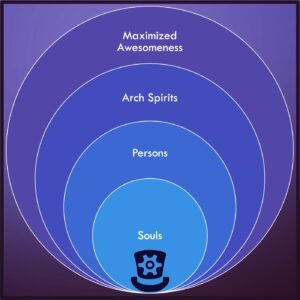
But a person can be entirely immaterial too. A person does not have to be associated with any material world. They can be entirely immaterial. On account of the creative imagination of Omniscience, the number and type of spirits and souls in every variety of Universe may be innumerable.
Now that we know what we are, what does all this have to do with abortion? Well, we now have the necessary backdrop for the discussion of any moral topic. The reality is that you are a soul in a bundle of souls connecting you to the Multiverse through the spiritual glories to which you belong as a Person in unity and communion with a multi-personhood. You are not just a soul but also a spirit sharing in the glory of individual mind, multi-mind and the Omni-Mind of Maximized Awesomeness.
When does life begin? At conception? Does the possibility of twinning after conception lead to a later date for personhood? Or does it lead to a bundled set of persons and souls sharing the same set of cells and DNA in the same Universe from the date of conception? What does consciousness have to do with it?
If time is subject to consciousness and a fetus is not conscious, then is there any sense in which terminating it would be a sin?
Also, if it is all good, why does right or wrong matter?
There are still reasons. From the standpoint of the chronological soul, two things are affected by a termination of a pregnancy:
- The potential of every soul in that bundle for a very great number of Universes, and
- The potential each of those souls had for the benefit of each of those corresponding Universes.
It might be tempting to say that if there is nothing evil in Maximized Awesomeness, there can be no evil in terminating pregnancies. From the standpoint of a soul sharing the holy mind, in communion with the multi-mind and the Omni-Mind of Maximized Awesomeness, that is correct. There is no evil. But from the standpoint of the chronological soul in temporality, there is a relationship to time and space in not just one Universe, but as many Universes as possible futures could contain. The removal of that soul from one material Universe changes the potential of not just one Universe, but every Universe it will ultimately split into as it unravels. It not only robs a soul of life, but a bundle of them and a bundle of Universes corresponding to them.
That would sound harsh if I was trying to make you feel guilty here, but I’m not. Quite the contrary, maybe the rationale for getting an abortion or justifying it is correct. Maybe we should be looking at the best possible tradeoffs in a world full of crisis and consider all of the worlds that could only happen if those pregnancies were terminated. That would be something philosophers call “utilitarianism.” We’ll get to that in the coming episodes. My goal here, in discussing identity, is to lay a foundation for thinking through moral decision making in all of its complexity. We need to know why something might be wrong, not just whether it is wrong. What we’re after is understanding.
The imperative to maximize awesomeness comes from understanding what we are so that we can know what our purpose is. We can figure that our purpose in any world is to do our part to add goodness to it.
There is also a relationship we have both to Maximized Awesomeness and to any Universe we find ourselves in. We are on an assignment from God, so to speak. Our personhood is not something we gave ourselves. It is something bestowed on us by sharing in some portion of the goodness that lacks no good thing, as spiritual people, as entities.
In that sense, even our own identity is not ours. Nothing of what we are is actually our own. It is all given to us on loan. We are here on loan with a purpose, to improve the Universes we are being unbundled into, to do what we can to make them as awesome as possible.
Now, if you’ve aborted a child, unburden yourself from the guilty feelings associated with robbing their life. As persons, there are many Universes in which their lives are not taken. It is their life in this specific bundle of Universes that you’ve robbed them of and not the others. And if that is a sin, it also is an illusion. You did not actually have that abortion. You remember having it for the sake of doing some good thing according to your current state of understanding. Your sense of the past may well be an illusion.
Simply look ahead and consider what you could do to add to the worlds goodness and beauty, and the many worlds that can emanate from them, from this moment forward.
As for aborted preborns in this bundle of Universes, every other good possibility happens to them – just not in this particular set of futures. They do have many great futures, just stemming from a different bundle.
Before going, I want to say thank you for your patience as we’ve tackled some very difficult topics. Pamalogy presents a more complex view of these things than most people are used to, but I don’t think it’s possible to understand the ramifications of abortion, or for any moral question, without a good understanding of these things. We need to know where we stand in the Universe, we need a sound identity theory, and we need a firm knowledge of our purpose in this Universe before we can move forward. We’ll keep coming back to this. It will serve as a backdrop as we descend the high mountains of metaphysics and enter the demanding world of day to day awesomeness.
We’ve nailed down the hard parts first. Next time, we’ll dive straightway into women’s rights as we lay a groundwork for a system of morality that we can all agree on. It’ll get easier from here. I promise. Ciao!
URL for sharing this transcript page: https://pamalogy.com/2022/05/12/spirits-souls-identity-and-personhood/
URL for sharing this podcast: https://player.captivate.fm/episode/9a7b3c5a-9c2a-4136-8cde-e7cb04daa787
URL for sharing just the audio file: https://podcasts.captivate.fm/media/1de62a19-95b8-4af4-b945-5f93715b2677/Episode16-UnbundlingSouls-converted.mp3
Previous: What Are We?
Up Next: Women’s Rights in the Multiverse


